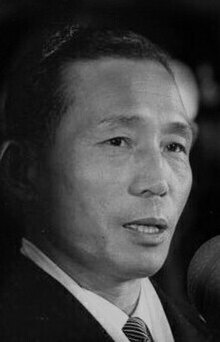Park Chung Hee
| Park Chung-hee | |
|---|---|
| 박정희 朴正熙 |
|
 |
|
| 3rd President of South Korea | |
|
In office 17 December 1963 – 26 October 1979 Acting President from 23 March 1962 |
|
| Prime Minister |
Choi Tu-son Chung Il-kwon Paik Too-chin Kim Jong-pil Choi Kyu-hah |
| Preceded by | Yun Posun |
| Succeeded by | Choi Kyu-hah |
| Chairman of the Supreme Council for National Reconstruction | |
|
In office 3 July 1961 – 17 December 1963 Deputy Chairman from 16 May 1961 |
|
| Preceded by | Chang Do-yong |
| Succeeded by | Position abolished |
| Personal details | |
| Born |
14 November 1917 Sangmo-ri, Seonsan County, Gumi-myeon, Gyeongsangbuk-do, Japanese Korea (present-day Seonsan-eup, Sangmo-dong, Gumi, North Gyeongsang, South Korea) |
| Died | 26 October 1979 (aged 61) Seoul, South Korea |
| Cause of death | Gun Shot |
| Resting place | Seoul National Cemetery |
| Nationality | South Korean |
| Political party | Democratic Republican |
| Spouse(s) | Kim Ho-nam (divorced) Yuk Young-soo |
| Children |
Park Geun-hye (1st daughter, 1952–) Park Geun-ryoung (2nd daughter, 1954–) Park Ji-man (only son, 1958–) |
| Alma mater |
Imperial Japanese Army Academy Korea Military Academy |
| Religion | Buddhism |
| Signature |  |
| Military service | |
| Allegiance |
|
| Service/branch |
|
| Years of service | 1944–1963 |
| Rank | General |
| Battles/wars |
Second Sino-Japanese War World War II Korean War |
| Park Chung-hee | |
| Hangul | |
|---|---|
| Hanja | |
| Revised Romanization | Bak Jeonghui |
| McCune–Reischauer | Pak Chŏnghŭi |
| Pen name | |
| Hangul | 중수 |
| Hanja | |
| Revised Romanization | Jungsu |
| McCune–Reischauer | Chungsu |
Park Chung-hee (Korean pronunciation: [päk̚.t͈ɕʌŋ.ɦi]; 14 November 1917 – 26 October 1979) was a South Korean president and military general who led South Korea as a dictator from 1961 until his assassination in 1979. Park seized power through the May 16 coup, a military coup d'état that overthrew the Second Republic of South Korea in 1961 and ruled as a military strongman at the head of the Supreme Council for National Reconstruction until his election and inauguration as the President of the Third Republic of South Korea in 1963. In 1972, Park declared martial law and recast the constitution into a highly authoritarian document, ushering in the Fourth Republic of South Korea. After surviving several assassination attempts, including two operations associated with North Korea, Park was assassinated on 26 October 1979 by Kim Jae-gyu, the chief of his own security services. He had led South Korea for 18 years. Park's first-born daughter, Park Geun-hye, is currently the suspended President of South Korea.
Park was born on 14 November 1917, in Gumi, North Gyeongsang in Korea under Japanese rule, to parents Park Sung-bin and Bek Nam-eui. He was the youngest of five brothers and two sisters in a poor Yangban family. As a youth, he won admission to a teaching school in Daegu and worked as a teacher in Mungyeong-eup after graduating with a teaching degree, but was reportedly a very mediocre student. Following the outbreak of the Second Sino-Japanese War, the ambitious Park decided to enter the Changchun Military Academy of the Manchukuo Imperial Army, with help from Imperial Japanese Army Colonel Arikawa (a drill instructor at the teaching school in Daegu who was impressed by Park's military ambitions). During this time, he adopted the Japanese name Takagi Masao (高木正雄?). He graduated top of his class in 1942 (receiving a gold watch from Puyi himself) and was recognized as a talented officer by his Japanese instructors, who recommended him for further studies at the Imperial Japanese Army Academy in Japan.
...
Wikipedia
